As a young adult, life can be very stressful. You might be juggling work and college responsibilities, living on your own for the first time, or experiencing your first serious relationships.
In this guide, we’ve explained how to find a therapist who specializes in helping young adults.
After, we’ve explained more about the types of mental health struggles you might face at this stage of your life, and how to choose the right therapist to support you.
Want to skip right to the suggestions for young adult therapy? Here are our 7 recommended therapy solutions:
- BetterHelp
- Teen Counseling
- Find-a-therapist.com
- Online-therapy.com
- TalkSpace
- Inclusive Therapists
- Clarity Therapy NYC
Therapy for young adults
Here are some online platforms, services, and therapist directories you can use to find a therapist who specializes in helping young adults.
| Provider | Good For | Location | Pricing |
|---|---|---|---|
| BetterHelp | Quick match with the right therapist four you | Online therapy | $65 to $90 per week (billed every 4 weeks) |
| Teen Counseling | Teens from ages 13-19 | Online therapy | $65 to $90 per week (billed every 4 weeks) |
| Find-a-therapist.com | Finding and contacting the right therapist for you | Online and in-person therapy | Varies depending on the counselor fee |
| Online-therapy.com | Finding licensed and experienced therapists with a Cognitive Behavioral Therapy (CBT) approach | Online therapy | $40/week to $88/week (including our 20% discount first month) |
| TalkSpace | Depression, anxiety, bipolar disorder, OCD, PTSD, psychiatry | Online therapy | Varies according to insurance coverage or self-pay options |
| Inclusive Therapists | Finding and contacting the right inclusive therapist for you | Online and in-person therapy in the U.S., Canada, Hong Kong, Portugal, Taiwan, and Thailand | Varies depending on the counselor fee |
| Clarity Therapy NYC | Adolescents, emerging adults, college students, LGBTQIA+ | Online and in-person therapy in N.Y. | $125 to $400 per session |
1. BetterHelp
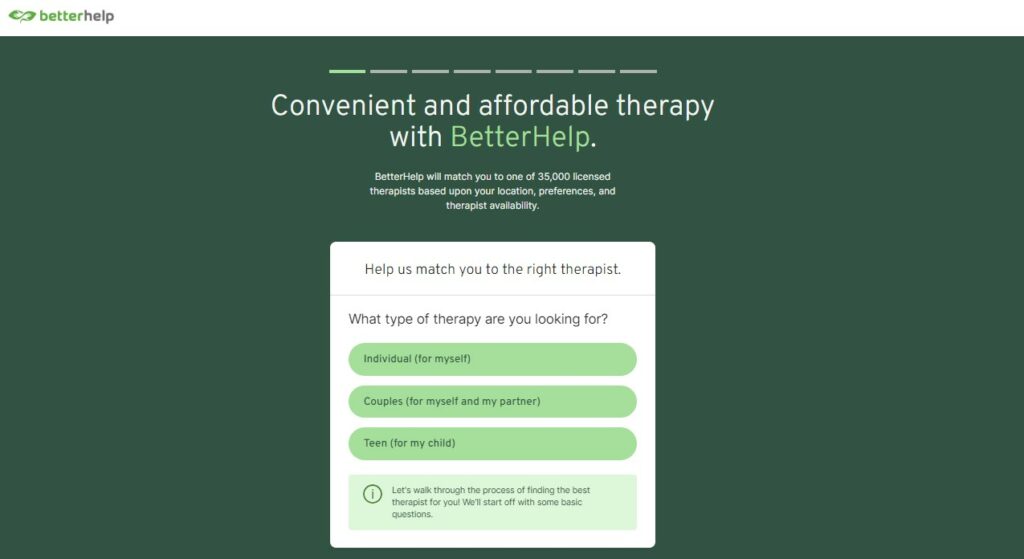
Explore emotional well-being with BetterHelp – your partner in affordable online therapy. With 30,000+ licensed therapists and plans starting from only $65 per week, BetterHelp makes self-care accessible to all. Complete the questionnaire to match with the right therapist.
- Good for: Quick match with the right therapist four you.
- Location: Online therapy.
- Pricing: $65 to $90 per week (billed every 4 weeks).
- Features: iOS and Android app available, message your therapist anytime, live sessions are scheduled weekly and done via live chat, phone, or video call.
On BetterHelp, the therapists don’t all specialize in helping young adults. However, plenty of their counselors do, and to connect with one, all you need to do is mention your preference when signing up. Then, the people at BetterHelp will match you with the right therapist or counselor – meaning, you don’t need to spend ages searching for the right professional.
Read our BetterHelp review here.
2. Teen Counseling
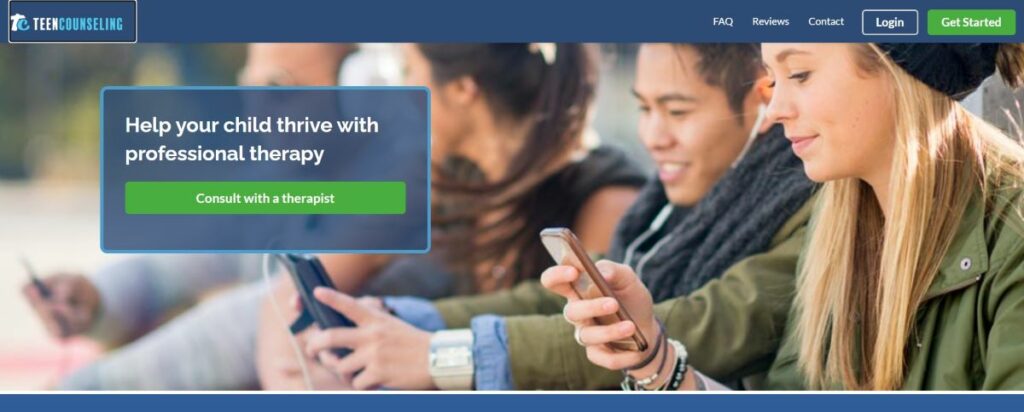
Nurture your teenager’s well-being through Teen Counseling. Tailored for ages 13-19, their online therapy begins at $65/week. This includes a weekly live session, the flexibility to message your therapist at any time, and the opportunity for parents to connect with therapists. Empower your teen’s journey today with Teen Counseling – start with their online questionnaire.
Note: We collaborate with top-tier mental health companies and receive advertising fees from purchases through the Teen Counseling links.
- Good for: Teens from ages 13-19.
- Location: Online therapy.
- Pricing: $65 to $90 per week (billed every 4 weeks).
- Features: The platform is designed to make finding a therapist easy, message your therapist anytime, live sessions are scheduled weekly and done via live chat, phone, or video call.
Therapists on Teen Counseling are licensed, trained, experienced, and accredited psychologists (Ph.D./PsyD), licensed clinical social workers (LCSW/LMSW) or licensed professional therapists (LPC). Each therapist has a Master’s Degree or a Doctoral Degree in their field, and is experienced at helping teenagers and young adults improve their mental health (many in fact specialize in helping young adults and adolescents).
3. Find-a-therapist.com
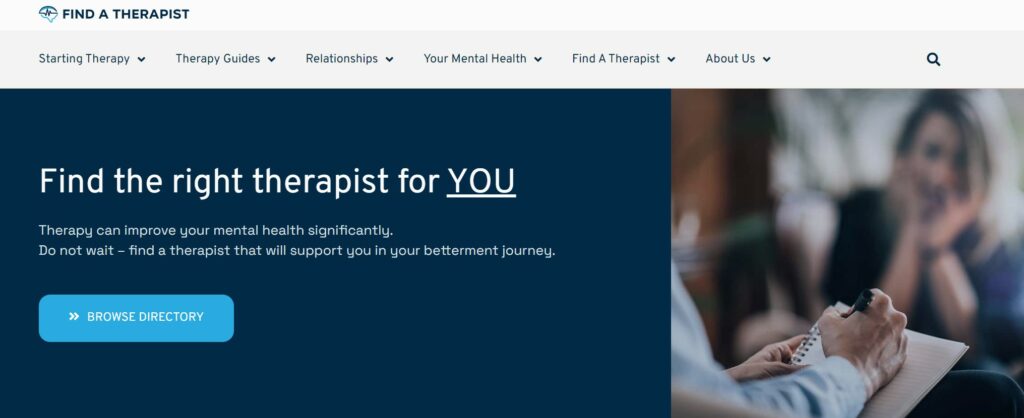
- Good for: Finding and contacting the right therapist for you.
- Location: Online and in-person therapy.
- Pricing: Varies depending on the counselor fee.
- Features: Filter your search, find accessible and effective online and in-person therapy, find guides on different types of therapy.
Find-a-therapist.com is an online platform that enables users to customize their search for therapists based on various criteria, including the type of therapy, specific issues addressed, therapist gender, languages spoken, and more. This allows you to find a therapist that specializes in treating young adults like Meghan Yahrling.
4. Online-therapy.com
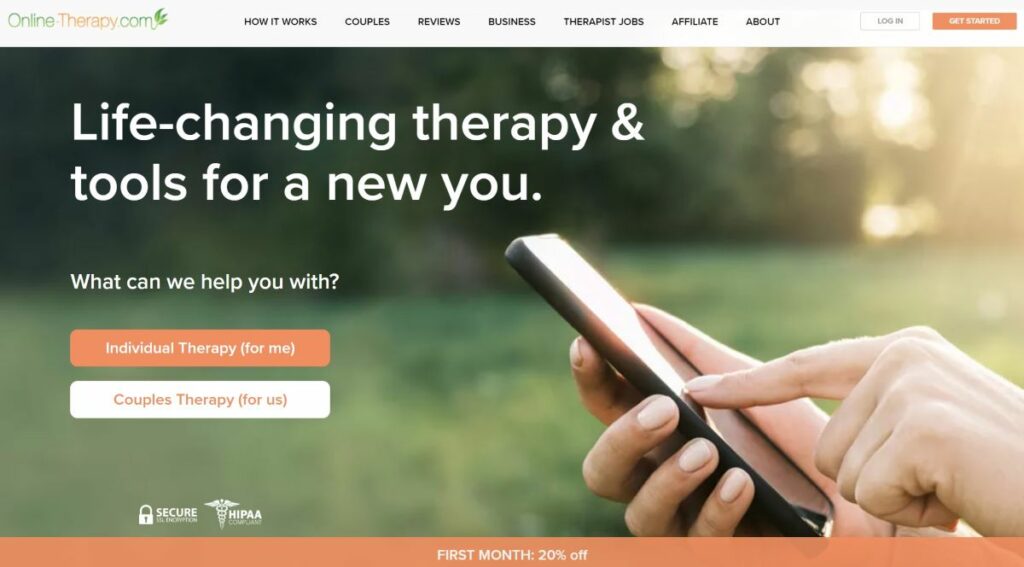
Discover transformative online therapy with Online-therapy.com. Through cognitive behavioral therapy (CBT), Online-therapy.com offers individual and couples support starting at $45/week. Engage in sessions via video, voice, or text for maximum flexibility. Fill out their online questionnaire to get started.
- Good for: Finding licensed and experienced therapists with a Cognitive Behavioral Therapy (CBT) approach.
- Location: Online therapy.
- Pricing: $40/week to $88/week (including our 20% discount first month).
- Features: Unlimited messaging with your therapist, including a daily journal and activity plan, yoga and meditation videos, and tests to see your progress.
Online-therapy.com ensures that therapists have a full license, 2000 hours of clinical experience, and proficiency in Cognitive Behavioral Therapy (CBT), a therapy approach that can help young adults manage different issues they face.
Read our online-therapy.com review here.
5. TalkSpace
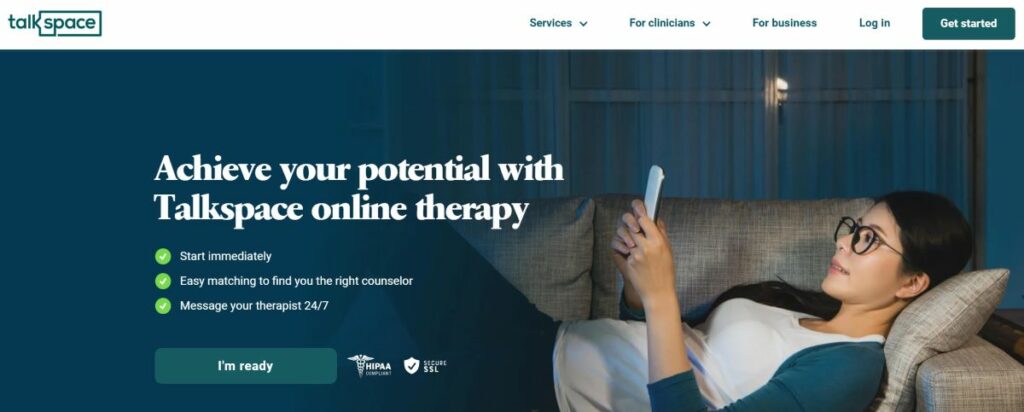
Tailored to individuals, couples, teens, and offering psychiatry services, Talkspace plans kick off at a wallet-friendly $69 per week. What’s more, many health insurances also cover their services, enhancing accessibility and affordability. Complete a questionnaire and get matched with the right therapist for you.
- Good for: Depression, anxiety, bipolar disorder, OCD, PTSD, psychiatry.
- Location: Online therapy.
- Pricing: Varies according to insurance coverage or self-pay options.
- Features: Accepts insurance, pick your therapist from a list of recommendations, live video sessions and unlimited messaging with your therapist, medication management.
TalkSpace is an online therapy platform offering mental health services, providing a convenient and accessible option for young adults. The platform allows users to engage in therapy from the comfort of their own space through digital communication, offering flexibility in scheduling sessions.
Read our TalkSpace review here.
6. Inclusive Therapists

- Good for: Finding and contacting the right inclusive therapist for you.
- Location: Online and in-person therapy in the U.S., Canada, Hong Kong, Portugal, Taiwan, and Thailand.
- Pricing: Varies depending on the counselor fee.
- Features: Online directory, get matched with the right therapist for you, culturally responsive, LGBTQ+ affirming, social justice-oriented therapists.
Inclusive Therapists is a free-to-use directory that provides the contact information of therapists for young adults near you. To search specifically for the right therapist, you just have to select “Specialities”, followed by “Adolescents/teens” in the second field. Later, you have to put your zip code. Once you do this, a number of counselors who provide young adult therapy will be listed.
7. Clarity Therapy NYC
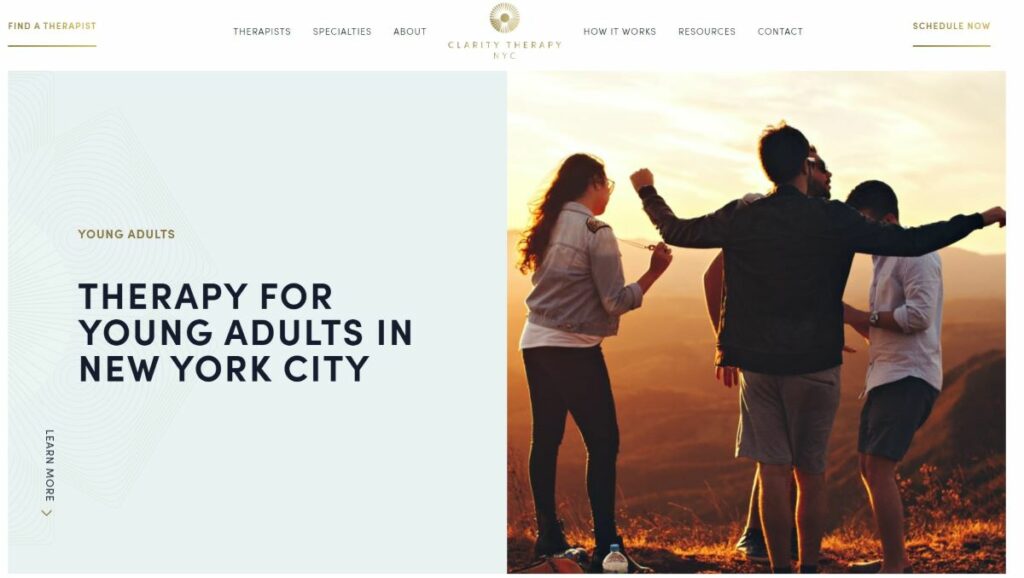
- Good for: Adolescents, emerging adults, college students, LGBTQIA+.
- Location: Online and in-person therapy in N.Y.
- Pricing: $125 to $400 per session.
- Features: Diagnostic evaluation, personalized match or choose your therapist, Out-of-Network providers.
The approach of Clarity Therapy NYC involves supporting young adults in reconnecting with their innate strengths and wisdom, focusing on enhancing their emotional health and overall wellness. They encourage self-care, self-acceptance, and responsibility for healing.
Common mental health issues faced by young adults

Our senior high school and college-age years are sometimes described as the best years of our lives, but in reality, the transition from adolescence to adulthood can be very challenging. It is not uncommon for 16-25(+) year olds to feel confused, overwhelmed, and emotionally stuck during this time.
Many young adults struggle with one or more of the following issues:
School or work
School and work can be very demanding on their own, and in many cases, young adults juggle both at the same time.
When obligations at work and school increase, sleep and wellbeing often take the backseat, and you may begin to feel anxiety and/or exhaustion. Staying afloat in the academic and work arena is particularly challenging for young adults that have difficulty focusing, especially if you have an issue such as ADHD.
Relationship issues

Young adulthood is often a time when we develop many new relationships, and our existing relationships change dramatically.
Friends from adolescence may split up, and new associations may grow. Family ties may be tested or strengthened. Dating, intimate relationships, and breakups can be an emotional roller coaster.
Young adults often desire a sense of community and belonging, but striking a social balance that is fulfilling and worthwhile can be a challenge. If you’re feeling stressed or depressed as a result of relationship challenges, therapists can help with this, especially those who specialize in helping with relationship issues, such as the counselors on ReGain.
Financial challenges
Once you stop living at home, or make your first large purchase (such as a car), you’ll soon realize that life can be surprisingly expensive.
After rent, utilities, groceries, gas, phone bills, and car payments (and perhaps health insurance and student loans), many young adults are left with quite a tight budget. Establishing financial independence and stability is undoubtedly stressful for young people, and therapists can help you to deal with the mental challenges associated with financial stress.
Difficulty making major life decisions

During your young adult years, you’ll have a lot of major decisions to make surrounding your studying, career, relationships, finances, and where you live in the world.
Should you apply for a four-year degree, a three-year degree, join the workforce, or apply for the military? Accept an internship, study abroad, or take a gap year? Continue to wait tables to save money, or begin college immediately to pursue a more fulfilling profession?
On top of immediate academic, work, social, and financial stress, many young adults also battle uncertainty about the future, no matter which decisions you make. This is perfectly normal, and mental health professionals know how to overcome these types of challenges.
Other psychological issues
Many young adults experience at least one mental illness. Approximately one in five teens (aged 12 to 18) currently experience at least one mental health issue, such as anxiety, depression, ADHD, bipolar disorder, or an eating disorder.
Unfortunately, young adults are more likely than older adults to self-medicate with alcohol and drugs, and are less likely to seek mental health help. This trend is alarming, since early detection and intervention are vital in preventing mental illnesses from persisting and worsening later in life.
Benefits of therapy for young adults

Young adults can set themselves up for success by opening up, expressing their emotions, and coming to terms with past trauma.
Even if you are unsure about attending therapy sessions, it can be worth trying, at least for a few weeks, to see if talking can help you overcome the issues that you’re facing.
Resolving relationship issues
Your counselor can help you find answers to questions related to your relationships and make you feel more secure about your relationship problems. Moreover, therapists can also help learn how to manage the emotions you may feel as a part of different relationships.
As we forge new relationships, there are also breakups and heartbreaks that many of us will face. Therapy can be an excellent space to explore and work through these issues, especially the airing out of feelings that comes after a breakup.
Relationships with family may also change during this time. For example, you may have differing feelings about religion when compared with your parents, especially as an older teenager.
Additionally, therapy can also help young adults communicate what they need during these difficult situations, as they heal and continue on their journey.
Alleviating symptoms of past mental traumas

By the time you reach young adulthood, you’ve had your fair share of bad experiences, heartbreak, and possibly trauma which may lead to the risk of unhealthy behaviors, such as substance abuse.
Through different psychological methods, a therapist can alleviate the symptoms of previous mental traumas. They can help you work through your mental scars, allowing you to overcome issues such as depression and anxiety.
Improving self-esteem and confidence
During our young adult years, we have to make many decisions about our goals in life, and who we are as a person, while simultaneously juggling work, study, and relationship commitments.
It’s human nature to compare ourselves with our peers, especially when faced with the expectations of others, such as parents and other close family members. As a result, the beginning of our adulthood can be a very trying time for our self-confidence and self-esteem.
Therapy can help restore and uplift your self-confidence. A counselor can help you recognize and reduce negative self-talk, and also help you with self-compassion and goal-setting, both of which are linked to improved self-esteem.
Therapists Specializing in Self-Esteem
Therapies used to help young adults
Suppose you feel that you are having trouble adjusting to life as a young adult, and would like to find new ways of managing the challenges you’re facing as they arise. Here are some of the therapies that might be used to make meaningful and positive changes in your life, when you seek help from a licensed therapist.
Note: this is not a complete list – some therapists who specialize in helping young adults will use other therapy methods.
| Therapy | Description |
|---|---|
| Insight-Oriented Therapy (Psychodynamic Therapy) | This therapeutic process involves the therapist and client exploring and understanding how feelings, thoughts, actions, and events from the past may influence our current mindset and circumstances. The goal of Insight-Oriented Therapy is to empower you with a sense of clarity so that you have the freedom to make new, adaptive, and healthier choices that support your continual growth, while upholding your mental health. |
| Cognitive Behavioral Therapy (CBT) | This process is focused on addressing thought patterns, physical symptoms, and behaviors. Research shows that CBT is a very effective form of treating various mental health issues, especially social anxiety. A CBT professional will create a safe space for you to feel comfortable starting the process towards personal growth, and help to reduce the feelings of depression and anxiety you are facing. CBT can be used alone, or combined with mindfulness/meditation. |
| Mindfulness Practices | Through consistent practice, like meditation, we can become more focused on the present, and better understand our experience in the here-and-now. Mindfulness teaches us to shift our attention away from negative thought patterns that lead to displeasing and problematic thoughts and behaviors, and move toward positive and meaningful growth. Mindfulness can be used alone or combined with insight-oriented therapy and/or CBT. |
Conclusion
Young adults face many unique challenges in their life, which may lead to problems such as eating disorders, substance abuse, self-esteem issues, depression, and mood disorders. You can seek support from a licensed professional counselor who has experience helping young adults, to you cope with these issues.
If you’re not sure how to find the right therapist, feel free to contact us and we’ll respond as soon as possible.







